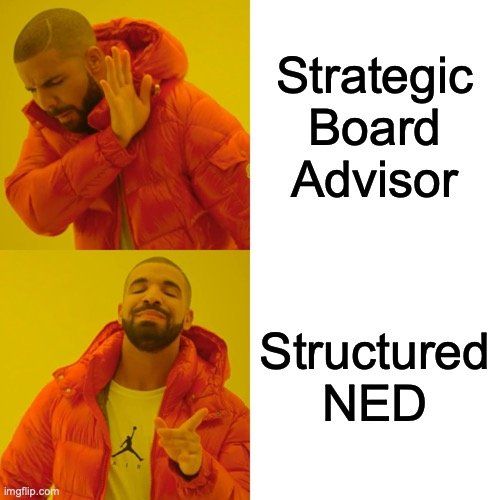Getting the best from your Non-Exec Director

Are you already or considering using the skills, experience, and personality of a NED (“Non-Executive Director”)? In small and medium-sized businesses, a NED was probably recommended to you, you’ve heard about, or it’s a role that you’ve seen work well in similar businesses to your own. In principle they’re a fantastic addition to your board and there are numerous third parties that avidly promote their usage.
But simply having that gravitas around your board table isn’t enough to transform the fortunes of your company. Too often we see NEDs working with companies with the best of intentions, but those companies aren’t getting the best from them.
In this article, we’ll give board members and company owners in SMEs five critical areas to consider getting the best out of their NEDs which should contribute to the success of your business.
What is a NED?
In the UK, a common misconception is that a NED is somehow different to an executive director of a company. Whilst a NED is often unable to commit the same level of time or attention to their company, they do still have the same legal and fiduciary responsibilities as their executive counterparts. And critically the same personal liabilities and risks. Keep that in mind as we go through this guide, since it’s a principal that’s going to be the foundation of the relationship with your NED.
If you don’t, you’re going to have an asymmetry of risk and incentive between the executive directors and the NEDs. It’s this asymmetry that you need to use to your benefit.
Sadly, we’ve seen too many NED relationships not work out. Not because either party was somehow incompetent or malicious, rather that the relationship wasn’t structured in the correct way to get the best out of each other.
Don’t fall into the trap of thinking that by simply having a business wizard around the place for a day a month will naturally bring success. Success won’t come passively. Use these tips to structure your relationship properly and you will both start feeling the benefits.
1. We all need managing
A key feature for us in any business, but particularly important in a SME... we all need managing.
You cannot allow any one person to deviate from the company goals and go lone wolf. Whether you are at the board table or cleaning the toilets, nobody can go off and do their own thing without agreement from the rest of the team. The smallest amount of wasted or negative energy in a SME can be incredibly destructive.
The directors are feeling the daily pain and the pleasure of running/owning the business. You need to ensure that your NED is entirely aligned.
You need to find a structure by which you can manage your NED. This may be via the monthly board meeting, one of you may take direct line management responsibility, or another NED may choose to manage them. Your NED may have other good suggestions too.
It’s also vitally important to understand from the outset what happens in the event of underperformance in the NED. Just because the NED has been successful before in a previous role, doesn’t mean that will automatically translate to your business. If it doesn’t work out, you need to have a system in place to detect and address underperformance quickly as you would any other employee in your company.
2. Objectives
You shouldn’t assume that the very presence of a NED will guarantee business success. This is a common mistake, so please don’t fall into this trap.
You need to put careful thought into what you want back from your NED. If you can’t answer this question satisfactorily, then you should reconsider a NED appointment. You may have a different set of problems that you are hoping will go away by surrounding yourself with successful people. That probably won’t work.
Agree and write down very clearly what the objectives of the NED need to be and why they are important to you. If there is any misunderstanding or disagreement, this is the perfect time to resolve it. The worst time is when something has gone wrong and people are staring at each other around the board table.
Once you’ve agreed and established your NED’s objectives, you then need to make sure that you are assessing their performance against those objectives on a regular basis. This can seem difficult, especially when your NED has had significantly more business success than you or if they are older. But it’s a great way to ensure you’re all working together for the betterment of the company. Your NED should enjoy the challenge and be proud to promote their personal brand by continuing to be associated with success in more companies.
Find a structure that works for you both. Maybe consider using something as simple as a 30/60/90-day plan.
Too many companies are disappointed that their NED didn’t open up their network of contacts to the sales teams or provide warm intros to prospects. After it’s all gone wrong is too late for getting upset that this didn’t happen. Did you target and manage the NED to do this in the first place?
3. Service Contract
It’s our view, that NEDs should always be signed up to a Director’s Service Contract. It’s common in SMEs for there to be no paperwork in place for the NED. All that happens is the NED submits a monthly consultancy invoice with a bit of itemisation on what they’ve done if you’re lucky.
This is too informal.
Speak to a solicitor to write you a simple contract for your NED which should broadly link back to the objectives you have now agreed.
The process and theatre of both parties putting pen-to-paper will reinforce the seriousness of the NED’s work. Seeking their signature will confirm their commitment to you and the company.
If at any time there is a reluctance to sign that contract, consider that a warning sign that the NED may not be fully committed.
4. Remuneration
When you’re negotiating what to pay your NED, make sure you link their remuneration to their required performance objectives. We’re of the view that no matter how tight cash is in your company, you need to pay your NED something. A good corporate solicitor can advise you on how to pay them linked to overall financial performance.
By attaching “value” to the relationship, your NED should then feel the obligation to work for it.
We regularly see NEDs that turn up (normally because they’re a shareholder), are paid nothing, ask a lot of distracting and time-consuming questions at the board meeting then disappear for another month. What this has likely been is a waste of everyone’s time that you can’t afford.
By being paid, your NED needs to understand the cost to the business and the corresponding value they are expected to deliver.
A lot of retired businesspeople on the NED circuit also complain about recent personal tax changes. Where things like IR35 have somehow restricted their ability to be a NED. This should be a massive red flag to you. Get your NED on payroll as an employee, not a consultant. They will likely be disadvantaged in respect of personal tax, but if you can structure their remuneration appropriately then it should trump any tax concerns in the long-run.
5. Statutory Directorship
To support the seriousness of your NED’s role, require them to become a statutory director (or create a formal journey where they very quickly become a director after an initial probationary period).
Company law technically does not distinguish between executive and non-executive directors. It's a common misconception that NEDs are somehow protected from investigation and personal liability after insolvency, gross negligence, fraud, criminality etc... they're not.
Use the risk of personal liability to your advantage as part of the suite that you need to share in the responsibility for running the company well. It also allays any confusion around “shadow directorships”.
You can also use the publicity of getting them on Companies House as content for your social channels.
Conclusion
In principle, NEDs should be a fantastic part of your company’s overall make-up. They can help you achieve your goals quicker, improve your governance, and potentially guide you with advice you wouldn’t have worked out on your own.
Whilst the term “strategic board advisor” has gained increasing popularity recently, this is always a big warning sign for us.
Often it’s a relationship that can be started with the best of intentions, but frequently gives inappropriate people an easy mechanism to collect consultancy fees from a company. They may not have the right skills, put in the requisite effort of feel the downside of underperformance. It often ends in disappointment, broken relationships, and destroyed value.
A thoughtful and well-structured NED appointment should address this.
If you’re considering appointing a NED or you want to discuss your board structure, our leadership consultants are on hand to discuss your unique situation. Book an initial free consultation with us here or email us directly info@branta.co.uk



